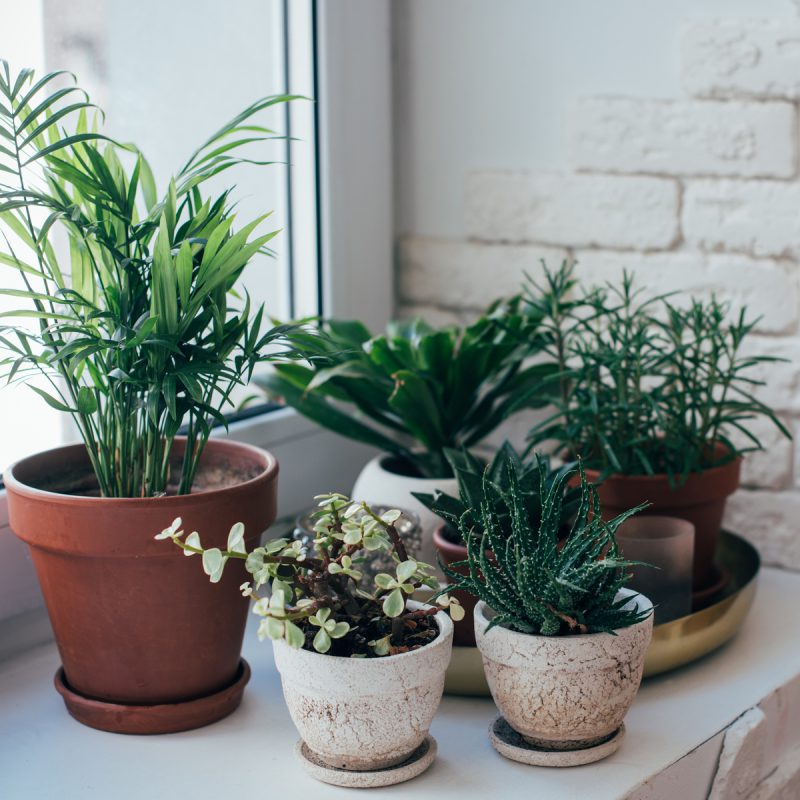It can be challenging to switch to a sustainable lifestyle, but there are ways to use your living space, no matter what size, to implement sustainable practices and feel right at home while helping the planet.
Indoor Plants
Caring for a potted plant can be a great hobby, and a way to practice being eco-friendly. Within a living space of any size (from a small, simple apartment to a three story residential house) houseplants can not only provide charming decor, but can also help to purify the air. Even NASA supports the practice of keeping air in your enclosed spaces clean through the use of houseplants. When selecting and buying a houseplant for your home, be sure to consider what kind of plant will best fit your living situation. Consider how much space you have, what kind of lighting you have available, how much time and effort you can give to the plant, and other factors like typical humidity levels.
Energy Conservation
You can practice energy conservation in any kind of living space and know that you’re helping the environment. For example, do you use batteries to power any devices in your home? Flashlights, remotes, toys, and other devices often use alkaline batteries. It may seem like a small difference, but switching from disposable batteries to rechargeable ones can reduce the waste you’re putting into landfills, and keep the chemicals in batteries from affecting the environment. Don’t forget about turning off lights and reducing your use of electricity for things like dishwashing and laundry (which can also reduce water usage). Even the smallest changes can help in a big way.
Outdoor Plants
For those with yards and outdoor spaces, there are even more opportunities to expand sustainable home practices. Consider planting trees in your yard, especially if you live in or near large urban areas. These trees can help to reduce air pollution, providing cleaner air, reducing CO2 levels, and producing more oxygen. Double A Paper is a firm believer in the power of trees to help the planet, as we did during our One Dream, One Tree campaign. If you don’t have the space for full-sized trees, consider a dwarf species, or ones that will fit in containers or large pots. If you would still prefer other plants, consider planting something that is considered sustainable, to be sure that you are not planting an invasive species that could harm your local ecosystem. Gardening is a wonderful hobby, and something you can do by yourself or with your family!
Landscaping
You can do more than planting to help the environment with your outdoor living space. Consider implementing some sustainable landscaping practices as well. For example, installing a drip irrigation system will save water when you need to provide water for your plants and grass. You can also install a rain barrel to gather rainwater, which will cut down on water usage (and save you money on your water bill as well). Think outside the box – could you use sustainable materials for your gravel? What about your outdoor lights – are they on motion sensors, timers, or left on for long periods of time?
Composting
Finally, consider starting a compost pile, either inside or outside your home. For those with smaller living spaces, or concerns about outside weather that may affect your compost, indoor composting is a great idea. If you plan to begin composting inside, be sure to use the proper materials. For example, vermicomposting (composting with worms) will require a special bin, worms, and materials to start. Regardless of what indoor composting method you use, include brown matter such as cardboard and newspaper, as well as green matter such as food waste and plant material. Remember to also include soil to help with the composting process.
If composting outside, give yourself enough space (especially if you want to keep the lovely aesthetic of your outdoor plants!). You may either make a container or use a bin, but be sure you can access it easily while keeping animals out of it. You can compost a variety of materials – everything from egg shells to toothpicks, as well as other food scraps and plant matter. Avoid putting fats, oils, waste, or cooked food into a compost pile, as those will attract pests. Also be sure to avoid putting diseased or parasite-ridden plants into your compost heap, as the compost will then be rendered unusable. Make sure to balance brown matter and green matter in your outdoor compost heap to get the best results.
Sustainability can be a major overhaul of your lifestyle, or just simple changes that add up over time. Either way, it must be a change in lifestyle, affecting not only office environments and business practices, but home life as well. Making these small changes in your living space can help the planet and help you to live a healthier life. Get started today!

